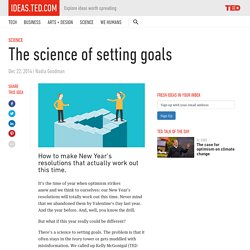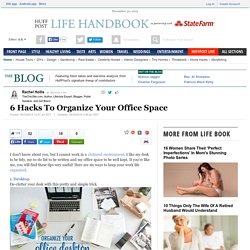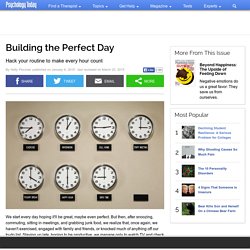

16 Ways To Make 2016 Your Most Organized Year Yet. The science of setting goals. It’s the time of year when optimism strikes anew and we think to ourselves: our New Year’s resolutions will totally work out this time.

Never mind that we abandoned them by Valentine’s Day last year. And the year before. And, well, you know the drill. But what if this year really could be different? There’s a science to setting goals. Choose a goal that matters, not just an easy win. Our brains are wired to love rewards, so we often set simple goals that make it easy to check off boxes. A meaningful goal — one that truly inspires you to change — requires going deeper. Focus on the process, not the outcome. When we set goals, it’s easy to fixate on that magical ending when we’ve reached the goal and everything is better. “People often get lost thinking they have to change everything all at once,” says McGonigal. “You can make very, very small changes that are consistent with your big goals without having to understand how you’re going to get to the endgame,” says McGonigal.
6 Hacks To Organize Your Office Space I don't know about you, but I cannot work in a cluttered environment.

I like my desk to be tidy, my to-do list to be written and my office space to be well kept. If you're like me, you will find these tips very useful! Here are six ways to keep your work life organized. 1. Desktop De-clutter your desk with this pretty and simple trick. 24 Ways To Have The Best 24 Hours Ever. From Manic Monday to Twisted Tuesday to Wacky Wednesday, it seems like there’s no escaping the chaos of a whirlwind work week.

By the time we finally reach Friday, we’re ready to give thanks with that celebrated saying, “TGIF.” Yes, weekdays can drag on, and on, and on -- but they shouldn’t have to. You should enjoy every day of the week. Together with Buick's 24 Hours of Happiness Test Drive, we’ve found 24 ways to make your next 24 hours productive, enjoyable and -- gasp! -- even relaxing. Nightcaps (Things You Can Do The Night Before) Building the Perfect Day. We start every day hoping it'll be great, maybe even perfect.

But then, after snoozing, commuting, sitting in meetings, and grabbing junk food, we realize that, once again, we haven't exercised, engaged with family and friends, or knocked much of anything off our to-do list. Staying up late, hoping to be productive, we manage only to watch TV and check Facebook before collapsing—and then starting all over again.
We can do better. Believe it or not, most of us have the opportunity to get more done. We actually spend more time on leisure than ever before, according to the federal Bureau of Labor Statistics, dedicating about five hours and 16 minutes a day to pursuits we perceive as pleasurable, like socializing and watching TV (although research finds no correlation between the latter and feelings of satisfaction). The foundation of any perfect or even half-decent day is adequate rest. Can we fix our day? So there's hope. 6 ideas from creative thinkers to shake up your work routine. Every seven years, designer Stefan Sagmeister (TED Talk: The power of time off) closes his New York design studio for a year-long sabbatical.

During each sabbatical, he pursues “little experiments, things that are always difficult to accomplish during the regular working year.” The effect on Sagmeister’s studio has been profound. “Basically everything we’ve done in the seven years following the first sabbatical came out of the thinking of that one single year,” he says. Don’t think you can take a year-long sabbatical? Below, 6 easier ways to recharge the creative spirit. Keep to a schedule. Willa Cather wrote for three hours a day. Go for a walk. Artist and author Maira Kalman (TED Talk: The illustrated woman) regularly takes breaks from the studio to go walking. Seek inspiration. Creative minds need to refuel to stay sharp. Stop while you’re ahead.
Novelist Henry Miller wrote until noon, then spent the afternoon recuperating and rejuvenating. Take a mini-sabbatical.